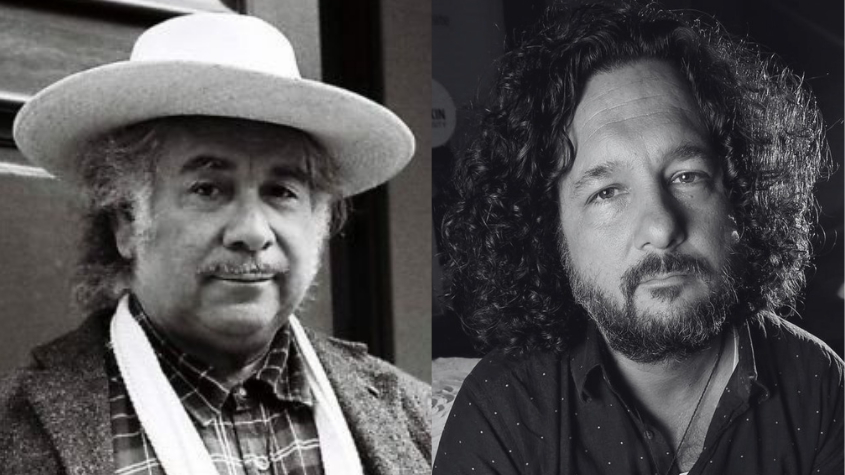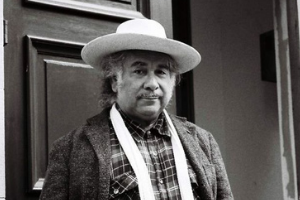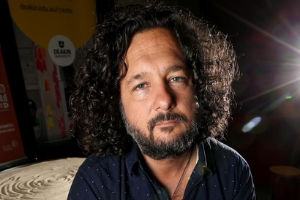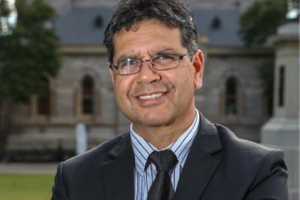Djon Mundine OAM FAHA and Dr Tyson Yunkaporta
Thursday 17 March 2022
Thursday 17 March 2022

Two prominent Aboriginal thought leaders will join the University of South Australia as part of a new Visiting Research Fellowship scheme. Curator, artist and activist, Djon Mundine OAM FAHA, and author, researcher and arts critic, Dr Tyson Yunkaporta were named the inaugural Pirku murititya UniSA Visiting Research Fellows – a donor co-sponsored program.
Djon is celebrated as a foundational figure in the exhibition of contemporary Aboriginal art. He is a fierce advocate and a driving force, consistently contributing to the development and exhibition of contemporary Aboriginal art in Australia, and internationally.
Tyson is an acclaimed scholar and the author of the award-winning book Sand Talk: How Indigenous Thinking can Save the World. His work provides us with a different way to make sense of the world and explores how we can apply Indigenous methods of inquiry to resolve some of world's most complex crises.
In this yarn, facilitated by UniSA's Professor Lester-Irabinna Rigney AM, the Pirku murititya UniSA Visiting Research Fellows will share their wealth of experience and expertise in their respective fields.
This event will be presented LIVE in the University of South Australia's Allan Scott Auditorium.

Djon Mundine OAM FAHA is a proud Bandjalung man from the Northern Rivers of New South Wales.
Mundine has held many senior curatorial positions in both national and international institutions, some of which include the National Museum of Australia, the Museum of Contemporary Art, Art Gallery of New South Wales and Campbelltown Art Centre. Between the years 1979 and 1995, Mundine was the Art Advisor at Milingimbi and curator at Bula-bula Arts in Ramingining, Arnhem Land for sixteen years.
Djon was the concept artist/producer of the ground-breaking 'The Aboriginal Memorial', which was central to the 1988 Biennale of Sydney. Parallel to the nation's Bicentennial celebrations, 'The Aboriginal Memorial' reminded people of what had been done to Aboriginal People, at a time when many were actively trying to forget. Comprising of 200 painted poles, by artists primarily from Ramingining and several surrounding communities in Central Arnhem Land, the artwork commemorates the Aboriginal People who have lost their lives defending their unceded land - with each pole symbolising every year since the 1788 British invasion. The Memorial has since been on permanent display in the main entrance hall of the National Gallery of Australia.
In 1993, Mundine received the Medal of the Order of Australia for service to the promotion and development of Aboriginal arts, crafts and culture. Between 2005 and 2006 Mundine was resident at the National Museum of Ethnology (Minpaku) in Osaka, Japan as a Research Professor in the Department of Social Research and is a PhD candidate at National College of Art and Design, University of NSW.
Djon Mundine OAM also won The Australia Council’s 2020 Red Ochre Award for Lifetime Achievement and is currently an independent curator of contemporary Indigenous art and cultural mentor.
As part of his Fellowship Djon Mundine will present this prestigious public lecture, and meet various community and cultural organisations, academics, and researchers. He will also be conducting workshops and introducing the Karrabing Film Collective who are presenting their work in a new exhibition at the Samstag Museum of Art with the Adelaide Film Festival.
Djon Mundine website
Defining Moments: The Aboriginal Memorial at the Biennale of Sydney with Djon Mundine
Djon Mundine OAM: 2020 Red Ochre Award For Lifetime Achievement
30 years on the Aboriginal Memorial as powerful as ever

Dr Tyson Yunkaporta belongs to the Apalech clan from western Cape York and is an Indigenous thinker and author currently living in Melbourne. He is the founder of the Indigenous Knowledge Systems Lab at Deakin University, which applies Indigenous complexity science perspectives and methods to addressing global crises in governance, economics, climate, cybernetics, education and more. He graduated cum laude with a Doctorate in Education from James Cook University in 2009 and worked with Elders and young people all over Australia until 2017, when he joined the academy temporarily as a researcher and lecturer. He has no idea what he will do next, as long as it's at least 3000 kilometres north of Melbourne.
Book: Sand Talk: How Indigenous Thinking Can Save the World
The New York Times: Beer with Bella: Tyson Yunkaporta
Linked In Profile
 In 2021 Professor Rigney was appointed member in the General Division (AM) for significant service to Indigenous Education and to social inclusion research. He is Professor of Education in the Centre for Research in Educational and Social Inclusion, University of South Australia. He was also Distinguished Fellow at Kings College, London.
In 2021 Professor Rigney was appointed member in the General Division (AM) for significant service to Indigenous Education and to social inclusion research. He is Professor of Education in the Centre for Research in Educational and Social Inclusion, University of South Australia. He was also Distinguished Fellow at Kings College, London.
One of Australia’s most respected Aboriginal educationalists, Professor Rigney is a descendant of the Narungga, Kaurna and Ngarrindjeri peoples. He is an expert on Aboriginal and Minority Education of the Pacific.
He is Scientific Committee Member for the international Foundation Reggio Children Centro Loris Malaguzzi. He has been recognised nationally for sustained and outstanding contributions to research in education by the Australian Council of Educational Leaders (ACEL) – one of Australia most prestigious scientific organisations. In 2018 ACEL awarded Professor Rigney its highest honour for writing – the Hedley Beare Award. Over the past three decades, he has been a member of several high profile expert committees including the Australian Institute of Health and Welfare COAG 'Closing the Gap' Scientific Reference Group, the National Aboriginal Reference Group 25 year Indigenous Education Plan and Australian Curriculum and Assessment Reporting Authority, National Languages Curriculum Reference Group. During 2016-2020 he was Scientific Expert on Longitudinal Study of Indigenous Children (LSIC).
His professional standing in education saw him inducted into the Australian College of Educators in 1998. Rigney is best known international for his work on Indigenist Research Epistemologies and Aboriginal Education that puts him at the forefront for early learning, schooling and language rights from 1990s to the 2000s. According to Rigney’s three principles of Indigenist epistemology – schools, teachers and researchers must build community partnerships and embed Aboriginal cultures as driving force for transformative, culturally responsive education. Many teachers and policy writers have been inspired by Rigney’s writings that promotes the idea that culturally responsive schooling is built from the experiences and abilities students bring to class.
Professor Rigney has worked across Oceania on Indigenous Education from New Zealand, Taiwan to Canada. He received an honorary United Nations award from the Australian Chapter for his work on Indigenous Education. In 2011 he won the National Aboriginal scholar of the Year NAIDOC. In the same year he was appointed by the Australian Government Minister for School Education, Early Childhood and Youth, to the First Peoples Education Advisory Group that advised on Indigenous early childhood and education. He was also Ministerial appointed Ambassador for Aboriginal Education.
Professor Rigney was the inaugural Co-Chair of Ethics Council for the National Congress of Australia's First Peoples. He co-authored the review of the National Indigenous Education document Australian Directions in 2009 that informed the Federal Government’s Closing the Gap policy for a decade. Professor Rigney is in constant demand as a commentator on national and international Indigenous matters and has published widely on Education, Languages and culturally responsive pedagogies.
The Pirku murititya UniSA Visiting Research Fellowship is a donor co-sponsored program and is part of the University of South Australia’s commitment to grow the community of Australian Aboriginal researchers and support Indigenous and First Nation led research globally. The Fellowship is part of The UniSA Visiting Research Fellows Scheme which is a UniSA innovation that will bring some of the world’s most talented minds and practitioners to Adelaide to work in partnership with UniSA researchers, businesses and the community.
Aboriginal Artists Named As UniSA Visiting Research Fellows

Presented by The Bob Hawke Prime Ministerial Centre, Samstag Museum of Art and the Office of the Pro Vice Chancellor: Aboriginal Leadership and Strategy, UniSA.
Image: Banner, Djon Mundine, The Aboriginal Memorial
While the views presented by speakers within The Bob Hawke Prime Ministerial Centre public program are their own and are not necessarily those of either the University of South Australia, or The Bob Hawke Prime Ministerial Centre, they are presented in the interest of open debate and discussion in the community and reflect our themes of: Strengthening our Democracy - Valuing our Diversity - Building our Future. The Hawke Centre reserves the right to change their program at any time without notice.
The copying and reproduction of any transcripts within The Bob Hawke Prime Ministerial Centre public program is strictly forbidden without prior arrangements.
While the views presented by speakers within The Bob Hawke Prime Ministerial Centre public program are their own and are not necessarily those of either the University of South Australia, or The Bob Hawke Prime Ministerial Centre, they are presented in the interest of open debate and discussion in the community and reflect our themes of: Strengthening our Democracy - Valuing our Diversity - Building our Future. The Hawke Centre reserves the right to change their program at any time without notice.